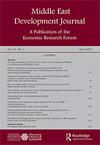COVID-19 shock 2020: impact on foreign and Kuwaiti workers and contrasts with employment, earnings and consumption during normal times
IF 0.9
Q4 DEVELOPMENT STUDIES
引用次数: 0
Abstract
ABSTRACT This paper uses micro-level data from the 2013 official Kuwait Household expenditure survey covering 2961 households; and three 2020 COVID-19 shock-related CEO, labor force and household surveys to juxtapose the consumption profiles of foreign workers in Kuwait. The paper contributes to a growing literature on foreign workers by focusing on foreign workers’ employment and earnings and consumption profiles following the COVID-19 pandemic. The paper compares differential consumption responses of 250 foreign and Kuwaiti households during the COVID-19 shock with profiles that existed during 2013, which was a shock-free year. Moreover, since foreigners represent nearly 70% of the population, OLS regressions were applied to the 2013 microdata and the 2020 household survey to inquire if standard consumption functions deployed in the economic literature hold in the case of foreign households in Kuwait and vets how their consumption responded to income shocks. Our data and empirical analysis corroborate that Kuwait’s foreign community bore the brunt of COVID-19 in terms of employment, earnings and living conditions. Moreover, our results broadly indicate congruence with Friedman’s permanent income hypothesis, and that for given income levels, consumption heterogeneity holds for foreign workers according to age cohorts, giving support to the life cycle hypothesis. The findings carry significant implications to Kuwait’s dichotomous labor markets, and to households’ income and consumption policies especially to Kuwait’s transformative policy to realize sustainable growth.2020年2019冠状病毒病冲击:对外国和科威特工人的影响以及与正常时期就业、收入和消费的对比
本文章由计算机程序翻译,如有差异,请以英文原文为准。
求助全文
约1分钟内获得全文
求助全文

 求助内容:
求助内容: 应助结果提醒方式:
应助结果提醒方式:


